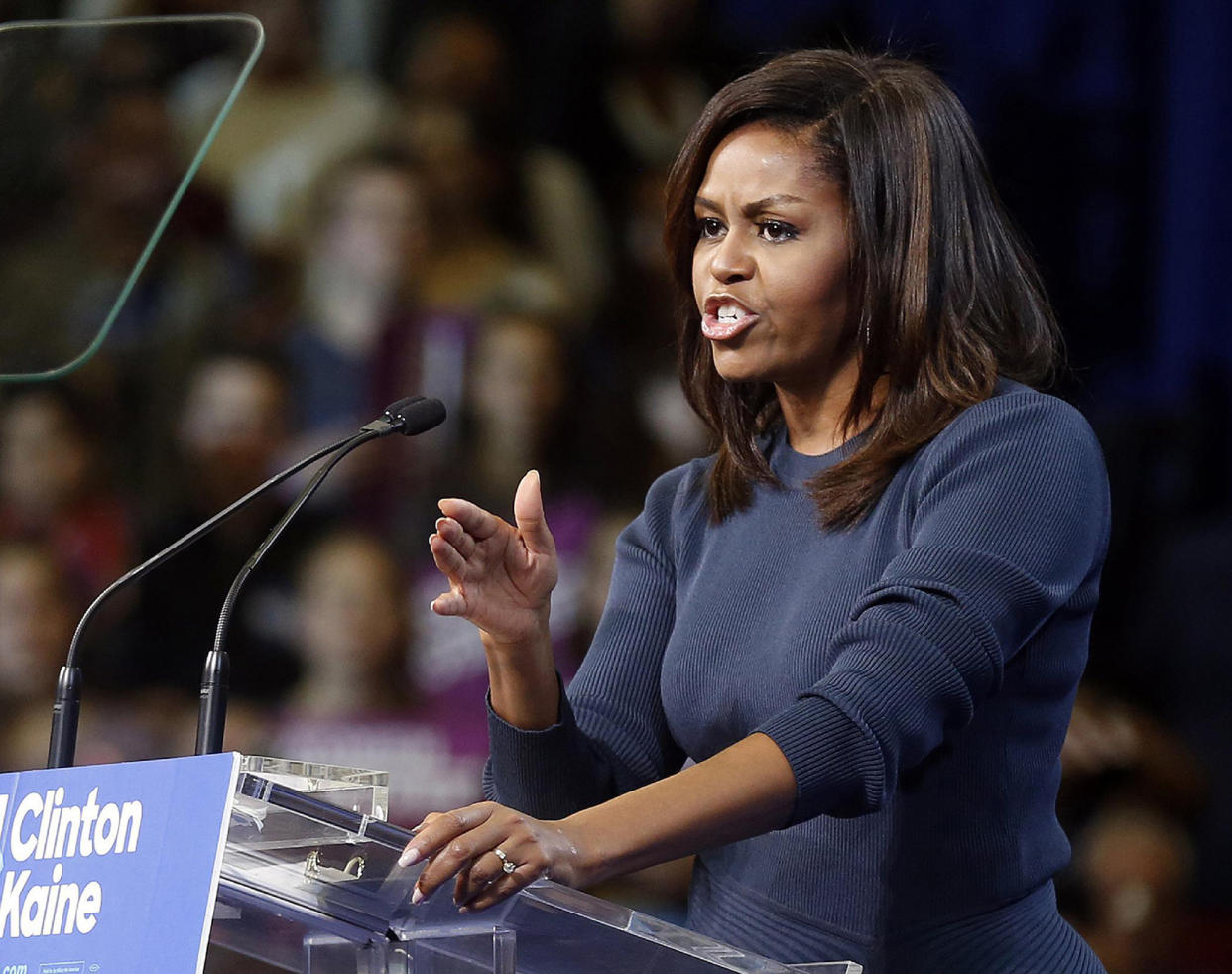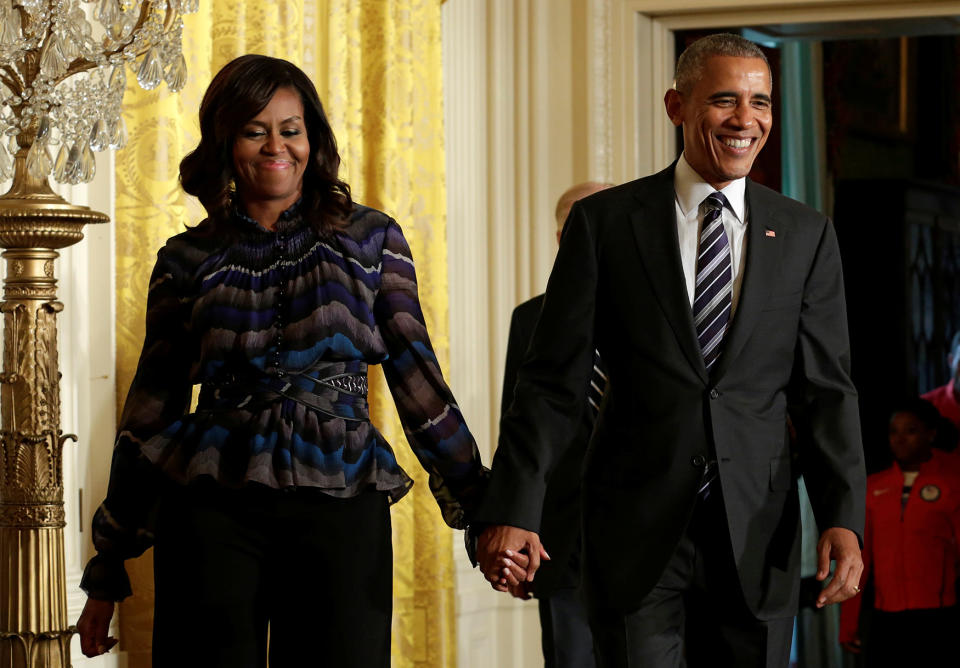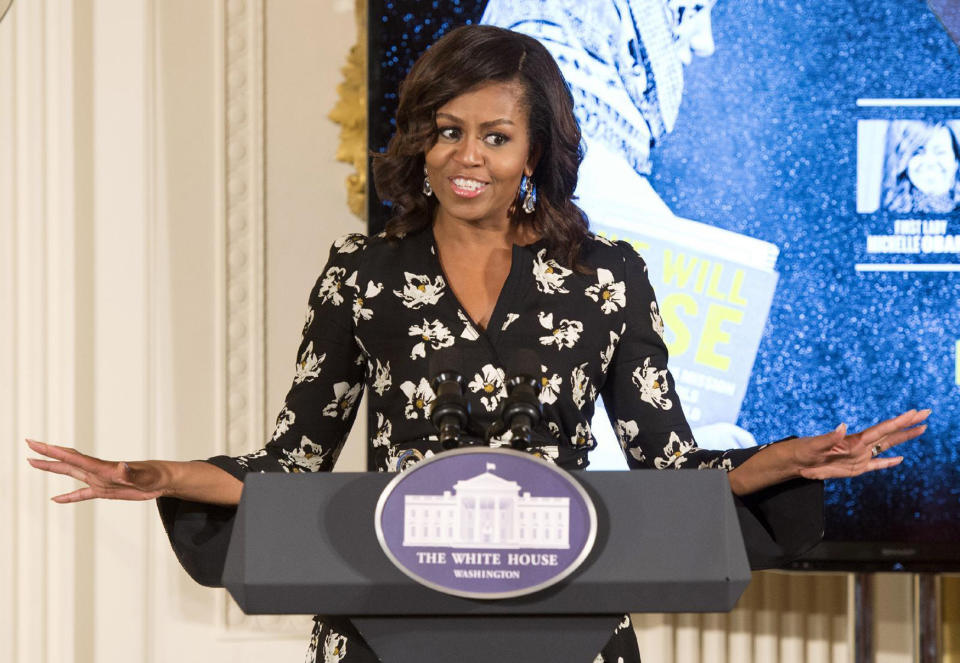Race, gender and the legacy Michelle Obama will leave behind

First lady Michelle Obama has enjoyed an average approval rating of 65 percent during Barack Obama’s two terms. She delivered two of the most memorable speeches of this year’s presidential campaign. She is the most admired national political figure in an age of mass distemper and distrust toward politicians of all stripes, and she has done it at a time when Donald Trump has taken over the Republican Party and struck a deeply racist, misogynistic chord among primarily white men (and women) without college degrees.
University of Maryland historian Robyn Muncy, author of Relentless Reformer: Josephine Roche and Progressivism in Twentieth-Century America, said “Michelle Obama may be the most effective politician among first ladies since Eleanor Roosevelt.” But, how has she pulled it off? In particular, what is the impact of the nation’s first African-American first lady on race and gender politics?
Recall that during the 2008 presidential campaign, the right stereotyped Michelle Obama — who since her husband’s 2004 keynote convention address had been cast into the political maelstrom — as an “angry black woman.” Speaking on Fox News in June of 2008, the right-wing pundit Cal Thomas, in words that prefigured Trump’s rise, captured the perceived threat to white male identity posed by an increasingly diverse electorate and heterogeneous country. “In this campaign, we are being asked to accept three things simultaneously, the first woman with a credible chance of being president [Hillary Clinton], the first African-American with the chance to being president and, whoever [sic] Michelle Obama is going to be styled, the angry black woman, first lady? This is an awful lot,” Thomas complained.
The New Yorker’s infamous, satiric and controversial cover after Obama’s primary victory depicted a rifle-carrying Michelle Obama fist-bumping Barack Obama wearing traditional Muslim clothes. And in early 2008 Michelle Obama handed her husband’s critics a talking point when she said, “For the first time in my adult life, I am really proud of my country.” Yet, amid a culture that remained hostile to African-Americans in the White House and that is now fueled by Trump’s depraved campaign, Michelle Obama has managed to explode the racist, sexist images hurled at her in 2008 and beyond. “She is emerging as a real political powerhouse in her own right, and she is certainly serving as a role model for women and girls of all races in her rock-solid integrity while in the public eye,” Muncy said.
Mary Ellen Curtin, a historian at American University who is writing a biography of African-American Congresswoman Barbara Jordan, argued that the first lady “built up a lot of human capital with emphasis on family, health, girls’ education and [she] did not squander it. No one ever thought of her as part of Barack Obama’s cabinet or policy advisor. She always said she was not interested. But now she is speaking out as a human being and a woman and a mom.”
Michelle Obama also “has managed to do a great deal of important work on behalf of families, children, and women without seeming to encroach on policy so much as Hillary Clinton did while in the White House,” Muncy observed, thereby avoiding Clinton’s political problems.

The first lady’s ability and willingness to speak directly to African Americans and whites on racial issues has bolstered her public standing across an increasingly diverse United States. At the same time, she has championed issues that are not explicitly about race, winning support from whites and people of color alike.
Michelle Obama “somehow hit the right balance between being a regular person and being a star,” Curtin added. Part of her popularity owes to the public’s regard for her as a role model for millions of young people, especially girls and women. In a culture dripping with celebrity headlines, reports of tawdry behavior from public figures and other signposts of national dysfunction, the first lady has been uncannily poised, uplifting and free from malice.
President Obama is experiencing some of the highest approval ratings of his presidency, in part because he is rightly considered to be the antithesis of Trump. Much the same can be said for the first lady, who is benefitting from the contrast to Trump’s degrading, even deranged campaign. Nonetheless, it’s also true that from her first days in the White House, Michelle Obama demonstrated a potent combination of dignity and decency, and her policy initiatives reflect her values.
Her “Let’s Move!” campaign combatting childhood obesity, her advocacy for military families, and her work on behalf of women’s rights and access to higher education for young people have been aimed at improving the lives of vulnerable populations. Michelle Obama has also managed to articulate the fears and, crucially, embody the hopes felt by millions of Americans. Coming across in the tradition of Eleanor Roosevelt, she has communicated her worries as a mother who understands the pain and daily concerns of ordinary Americans who have come to identify with the woman who is living in the White House. In her widely praised 2016 convention address, she candidly described the challenge of watching her young daughters go off to school “into those black SUVs with all those big men with guns. And I saw their little faces pressed up against the window, and the only thing I could think was, ‘What have we done?’ See, because at that moment, I realized that our time in the White House would form the foundation for who they would become, and how well we managed this experience could truly make or break them.”
This bond with the public has been built, as Curtin observes, over time. Moreover, as Muncy points out, Michelle Obama’s “when they go low, we go high” line is “setting a standard for all political activists baffled and shaken by the shocking, indeed downright depraved, level of so much current political rhetoric. She is an antiracist feminist leader of the first rank, a leader who understands how racial justice, gender justice, environmentalism and nutrition, for instance, are all connected.”
Michelle Obama has also insisted that her faith in America, despite its imperfections, remains unbroken. She has invoked the tradition of the suffrage movement, the civil rights movement and other movements that have sought to hold the nation to the standard set forth in the declaration that all people “are created equal.” For instance, she was also able to respond to the onslaught of racist attacks on the nation’s first African-American president with grace and dignity. Every day, she said at this year’s Democratic convention, “we try to guide and protect our girls through the challenges of this unusual life in the spotlight — how we urge them to ignore those who question their father’s citizenship or faith. How we insist that the hateful language they hear from public figures on TV does not represent the true spirit of this country. How we explain that when someone is cruel, or acts like a bully, you don’t stoop to their level.” Her own story, along with the causes and people she has championed, is yoked to American ideals of social equality, individual worth and expansive notions of rights and opportunity and has won over a sizable majority of the public.
Most of this year’s campaign hasn’t been focused on Michelle Obama, of course. Rather, it has been consumed with coverage of Donald Trump’s derogatory comments toward women, people of color and the disabled (to name a few of his favorite targets). Trump has caused progressives (and some conservatives) to despair that in 2016 the country has moved backward, into a darker time. Such despondency, however, has been offset to a degree by the demonstration of wisdom, equality and decency exemplified by Michelle Obama. The first lady has championed social equality and ultimately made the United States more keenly aware of its legacies of gender and racial discrimination. America is more just in 2016 than it was before she became first lady.

Matthew Dallek, associate professor at George Washington’s Graduate School of Political Management, is author of Defenseless Under the Night: The Roosevelt Years and the Origins of Homeland Security.

